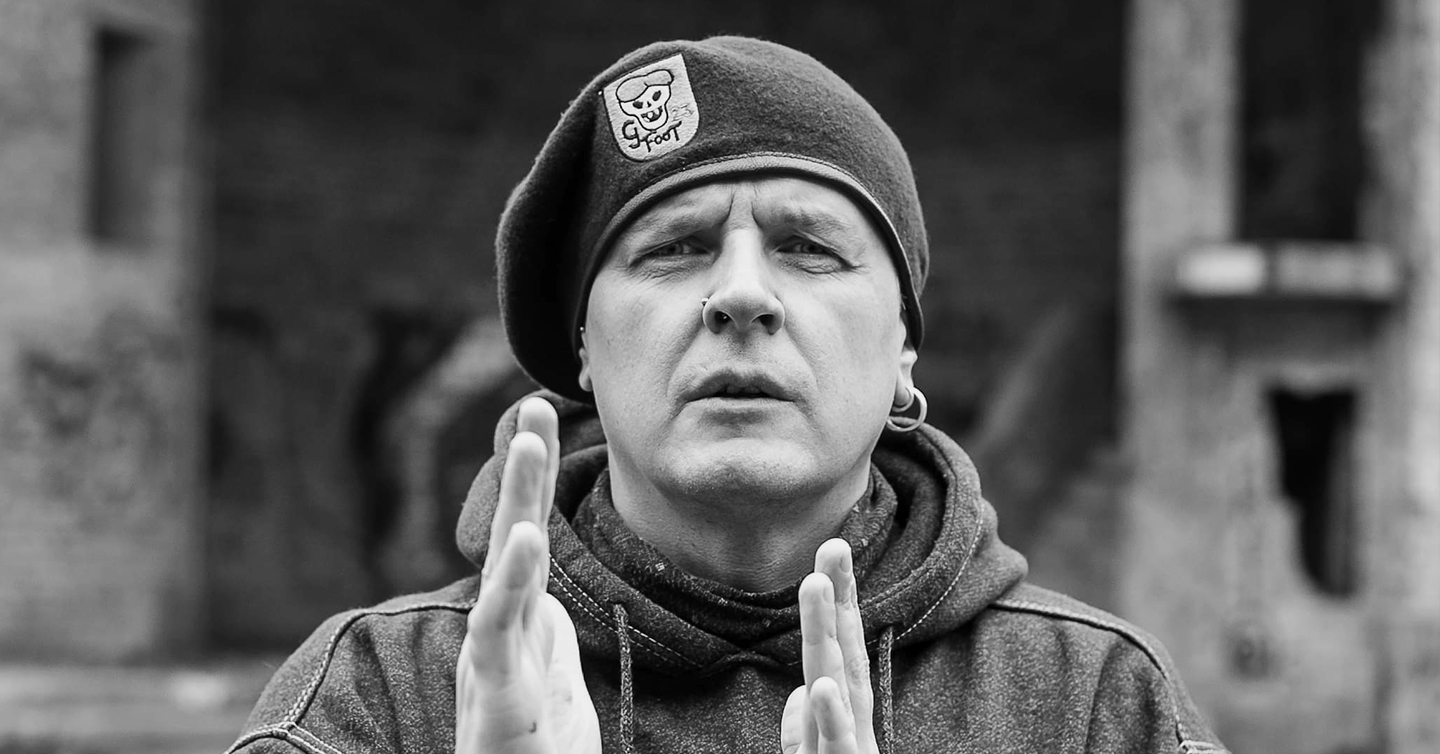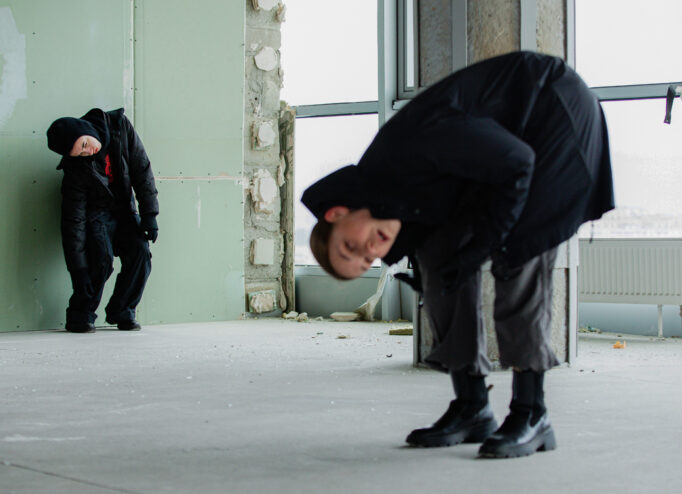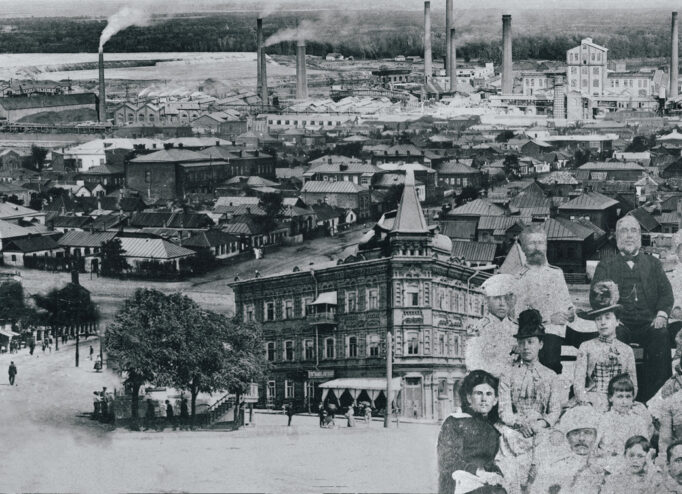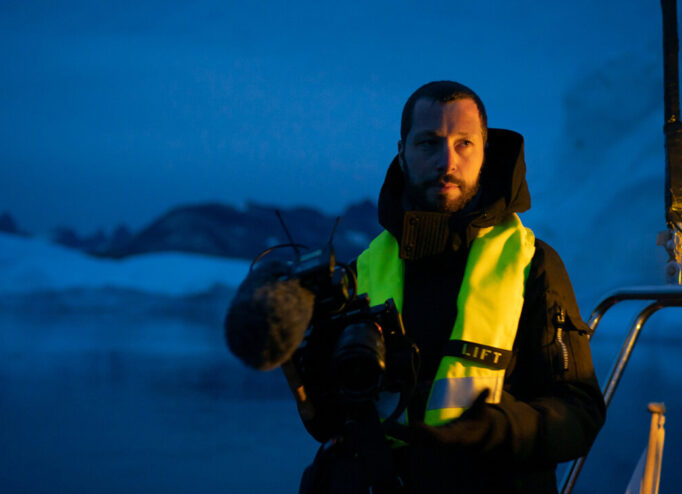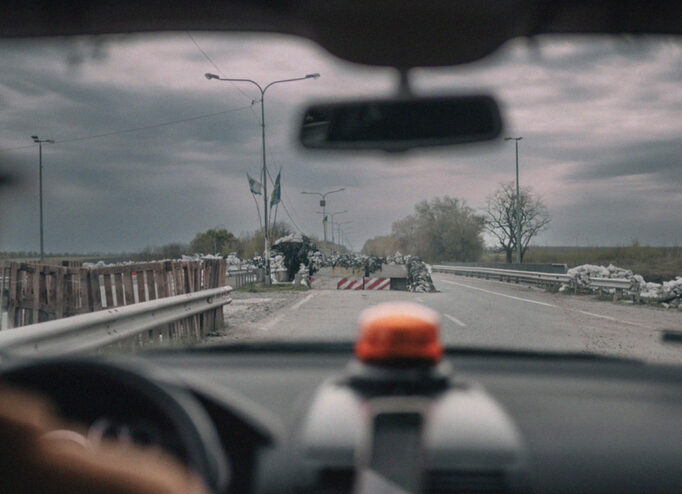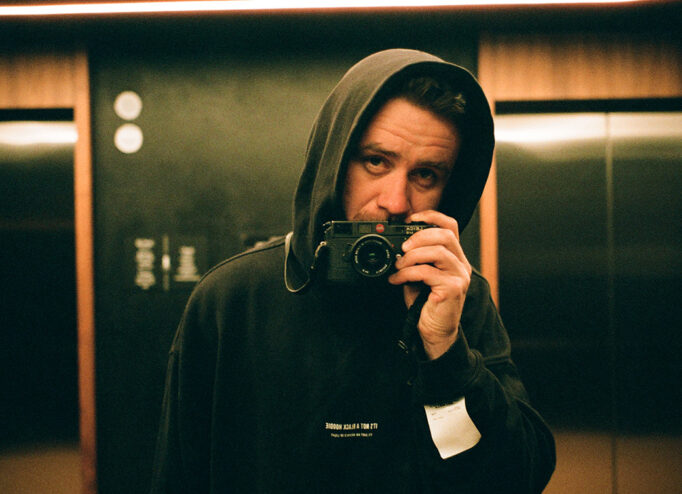Anton Slepakov, the leader of the «Vagonovozhatye», together with sound engineer Andriy Sokolov, released the first two tracks from the album «warnyakannya» on March 22. The musicians share their thoughts on the war and collect donations for volunteers in them. Slepakov stayed in Kyiv and continues working on the album, trying to make sense of everything going on around him.
DTF Magazine talked to the musician about why propaganda is stronger than culture, when it is possible to return to everyday life, and whether he will sing in russian in his new tracks
In 1997, Anton Slepakov gathered the band «My Friend Truck and I», which disbanded in 2012, but became one of the key representatives of the alternative scene of the Dnipro. This summer the band will reunite and play their first concert in Kyiv in six years. Slepakov’s other project is the band «Vagonovozhatye», formed with Valentyn Paniuta (guitarist Luk) and Stanislav Ivashchenko (drums DOK) in 2013. They released three mini-albums and three albums, one of which was in Ukrainian. The band is constantly experimenting with genres and formats, in particular, in 2016 Vagonovozhatye created a musical accompaniment to the film «Arrest Warrant» (1926) by Heorhii Tasin.
— I know about your attraction to trams. Perhaps there are fewer of them, along with the people, for the first time ever in Kyiv. What do you miss in the capital now?
— The trams partly work, they drive on a shortened route. Of course, it struck me when I saw the tram being used as part of the barricades to keep the enemy from moving freely. I miss peace not only in Kyiv, but in the whole country. We all want peace and victory. All the temporary difficulties we have in Kyiv seem very unimportant, seeing what these fiends are doing to other cities. They are wiping them out of existence. Kyiv is fairly normal now in terms of security, food and medical supplies. You can move around more or less.
— When and what was the first track you could listen to after the open invasion of russia and what emotions did it evoke?
— It must have been when the subway started moving slowly. I missed one of the departing trains and found my headphones in my backpack. I started looking for what tracks were on the iPod. One of the first was the Morphine live album. It’s music that’s not too annoying. There’s no major, positive vibe and movement. There’s some sadness and I listened to it to pass the time (about an hour until the next train) somehow. So far I’ve only listened to music on the subway. But I’ve been trying to listen to music for a week and a half now. It gives me the impulse to live. Music addiction is a kind of drug for me. I realized that I cannot do without music when I haven’t listened to it for almost a month. Some music I don’t listen to, some music I rewind, some music I turn off, but a lot of music is a protective background.
— Has the approach to writing music changed?
— I write the lyrics that come to me. I wasn’t actually going to do the musical process. It seemed wild and inappropriate to me. The lyrics started to appear on their own. As always happens, they don’t ask for permission. And when you realize that a lot of images follow from those words, you have to fix them.
Whether I was going to or not, I wrote down one verse first and then another. They remained in memory, like a snapshot. All modern people have this habit nowadays: you go somewhere and see a great shot. Click! And you’ve already taken it to Instagram. I’m not an Instagram person at all and very rarely use this opportunity, but words come to me with this «click» and they just came at a time like this.
My friend Andriy Sokolov said that we should definitely fix it the way we did before the war, when there was a project called «Stishenie obstoyatelstv». We don’t have a name for it and sometimes we call it what our program is also called, namely «Nesmontirovannyy», «Stishi», «Stishenie obstoyatelstv». He plays the music, and I voice the lyrics.
— Does the writer’s block catch up during the war?
— It turned out to be the opposite for me. The block is not that I cannot stop, but that, unfortunately, these terrible events in this terrible time have become an inspiration for me. There are many things that can be said and the only question is whether to do it or on the contrary it is better to be silent while the professionals of the AFU are working. For some, it’s a certain kind of therapy that people need, too. Sometimes you need a distraction from mundane matters or from the news feed, which is full of tragic and sad things.
— Do you have any recipes for «promotion» in the conditions of total tin, as it was after the news with Bucha?
— There are no such recipes. A normal person should not bury his head in the sand during such difficult times. You have to keep abreast and know what’s going on. There is no way to shut yourself off from it.
Unfortunately, the worst thing is to exist. You have to process it, but I don’t know how. We know from previous experience, when you have a loved one die, you have to live it for a day, a week, a month.
Still, everyday life absorbs you and you communicate with someone, find the strength to do something. It’s the same here: there’s something else to do. Usually sitting for 24 hours in a newsfeed is not okay. Even a person who is strong mentally and emotionally will go crazy if he doesn’t turn it off. But, of course, you have to keep an eye on it, stay informed.
— Have you been reproached that writing music is inappropriate right now?
— No one wrote such a thing. On the contrary, there was only support and positive feedback. Someone wrote that, unfortunately, he could not listen to music, but would do it when he could. There was no condemnation. In fact, there is quite a lot of music. Slukh or LiRoom post selections and tracks quite a bit. Some are using works made in peacetime, of course there are still remakes and re-recordings. The music hasn’t disappeared.
— There are four tracks on the album so far, but it is gradually being expanded. It’s practically coming out in progress. Is there a final point planned in it?
— We haven’t thought about that yet. We release 2-3 tracks, we get donations for them, we give them to our friends for volunteer and military needs and try to work on music if our enemies give us some time. Charity concerts are being discussed now, and we played for volunteers on April 7. There is already a minimal program, which can be supplemented with old tracks if desired.
How will the ending of the album be fixed and what will it be? There is already one recorded track with the flavor of victory. I’m even a little scared to release it, because there’s a lot of hopeful mood there, but it may still be a long way to win. We would like to have a full album, but we don’t think about what the concept should be. The concept right now is to release, to help, to fix.
I have always denied that our storytelling is about fixing and documenting time, typical of documentary filmmakers. Although it is possible to change conditions and characters, this process is still close to cinema.
— And with what emotion was the «warnyakannya» born?
— The trigger for this was tragic affairs, a sad note and a sad mood. Even when Andriy and I are discussing tracks in editorial mode, he asks me if I think the playback is cheerful. And yes, the mood is not fun when we combine it with the lyrics. Of course, we want it to be tactful and given the large amount of fun tracks and patriotic techno, this is not the time to worry, God forbid we offend someone or get in the way of boredom.
— There’s a lot of patriotic-heroic music now. Do you think there’s no need to mention this war in the tracks?
— I don’t think there should be any such thing. We are a free country and there should be no censorship. It should be at the creator’s discretion, because for a puritan there should be church canons and music played on violins and violas.
It was very weird to me, but friends told me that they were driving between Lviv and Kyiv and were constantly listening to the last album by the band «Vagonovozhatye». It’s nice, though I couldn’t imagine listening to the band Vagonovozhatye now. It seemed appropriate to them.
— Many artists have changed their attitudes toward russian culture, language, and media. What was the biggest change that happened to you in this context?
— This renunciation occurred in 2013-2014. It didn’t work out to give up russian music, and I did it gradually. At that time I did not know how to write in Ukrainian, but then it happened. I didn’t really want to go back to the old stuff at all after the release of Vognepalne. And although this album is 40-45 minutes long, it was not enough for a full concert. You can tell by the mood of the people that they want to hear the old compositions. I don’t know how it will be now.
In everyday life I speak russian only with those who also use it. At all public events I only speak Ukrainian. I think that it will gradually be supplanted on its own. The russian federation has done everything to make this happen so that none of the Ukrainians — even those who speak russian and consume russian content — have any desire to associate themselves with the Mordor country. Of course, it remains at the level of culture and language. It is impossible to cross it out.
— Will you go back to the russian language in the new tracks?
— Not in the new ones for sure. We’ve been making fully Ukrainian-language content in both Vagonovozhatye and Stishenie (including «warnyakannya») since the first Ukrainian-language tracks in 2017. Our first attempt took place in 2016. It was an invitation from the Dovzhenko Centre to dub silent films. At that time I didn’t know how to compose a text in Ukrainian yet and I wrote a sort of libretto, because it would have been incomplete Vagonovozhatye if I just did the musical accompaniment and was thrown out. Sashko Mikhed helped me make a full-fledged literary adaptation.
I’ll come back to the russian language when I have some dementia and release a collection of poems about Lenin and the party (laughs). I have written so much in russian that there is no need for it now. If you want to make performances with Ukrainian content, and there are enough of them, you need to catch up to equalize, and then exceed it.
— I came across a post on Instagram by producer Оlexander Rodnyansky, who wrote that russians have no right to talk about «russian culture» because of what happened in Bucha. Do you believe that culture would not allow what has already happened to happen?
— I haven’t really researched the issue of propaganda. But how in neighboring russia could people who studied at universities, who are familiar with philosophical works, who have read the best writers of world literature, believe such blatant lies for 20 years?
I don’t think culture has had much of a chance. The cultural stratum of people has always been interested in something, but they had to be interested in issues of imperialism and take an unacceptable and unpleasant position when they talk about the role of the younger brother.
When you watch interviews with local opposition figures now, they allow the formulation: «There are so many things mixed up in them». This condescending attitude has been around for a long time.
I guess it’s not so easy to live in an empire when you have Ukrainians, Baltic residents, and Georgians blowing on your doorstep. It’s better to make them look funny and to show someone with an accent and another as a dumbass. It’s just like in russian movies, which are popular in our territory. The culture didn’t have a chance to save anyone. The people who came to our land did not even master the primer. Judging by their conversations with their soulmates or mothers, culture was nowhere near there.
— In Western Ukraine there are already movie theaters, stand-up shows, and musicians playing in the streets. Don’t you get the impression that it’s too early?
— I was not in Lviv now, but that’s normal. Our brain works in such a way as to create comfortable conditions. And why should people hide in basements if there is no danger of being hit or attacked? Better to let them enjoy life, drink good coffee and food, ride eco scooters in compliance with the traffic regulations, without injuring anyone. That’s the way it should be. Kyiv is building a new ethic and model of behavior as best it can too, although the silence reigns for 5 days and seems unsettling and uneasy, as if something is being prepared. But the economy has to work, people need to do something and feed their families.
— Music streaming companies are leaving russia, and therefore their offices in Poland and other neighboring countries will influence us from there rather than from Moscow. How will this affect the Ukrainian music market?
— This is an interesting question, but it is better to study it after the victory. It’s a bit disappointing that our country was only noticed during the war. Our musicians could not get through to venues and streaming services.
We tried to go to Talin Music Week in 2017. According to our data, about two dozen Ukrainian artists applied for this showcase. Not a single one was chosen. At the same time, seven Belarusian bands and eleven russian bands were represented at the showcase. I’m not even talking about the EU countries. This is 2017, which was recently.
Of course, something will change. Right now they already want to invite a Ukrainian artist to sing a song before a football match, or there is a great example of interaction between Pink Floyd and Andriy Khlyvnyuk.
I don’t know and I’m waiting in terror when the first concert of the band Kasta or Valery Meladze’s show at the Palace Ukraine will be announced. I’m sure there will be a long line because there is a small door and they won’t have time to pass. There will be a line up to the Olimpiiska. I wish my words were not true, but I’m not sure what will happen next and whether Czech or Slovenian artists will replace the russians.
Streaming gives you russian artists if you listen to the Vagonovozhatye. For example, it’s Noize MC. Maybe it’s not such a bad choice, but still, why should I stand next to him? The offices didn’t understand that it’s music from different countries and it’s not like the music you’re listening to now.
— Five years ago we had an interview where you said that we should respect death. «It’s capable of pulling each of us whenever it pleases. It’s a strong opponent, and opponents should always be respected and should never be underestimated. I’m well aware that death may be waiting for me around the corner». Has that feeling changed now?
— Yes, of course. I expressed it back in my first Stishi that it doesn’t really matter when you’re killed, whether it’s February 24th, March, or April.
We are all killed as a country physically, our loved ones are killed, we are heartbroken. I have smelled the leaden stench of death over the past two years. First it was Covid-19, now it’s war.
I did not know that this was the plan of the country, or rather the helmsman of the russian federation. But I continue to respect death, and so far our relations are parity. I do not allow myself to make frivolous statements in its direction. Every opponent should always be respected, because in any fight a very dangerous thing can be done by the side you represent. You can underestimate your opponent and lose.
